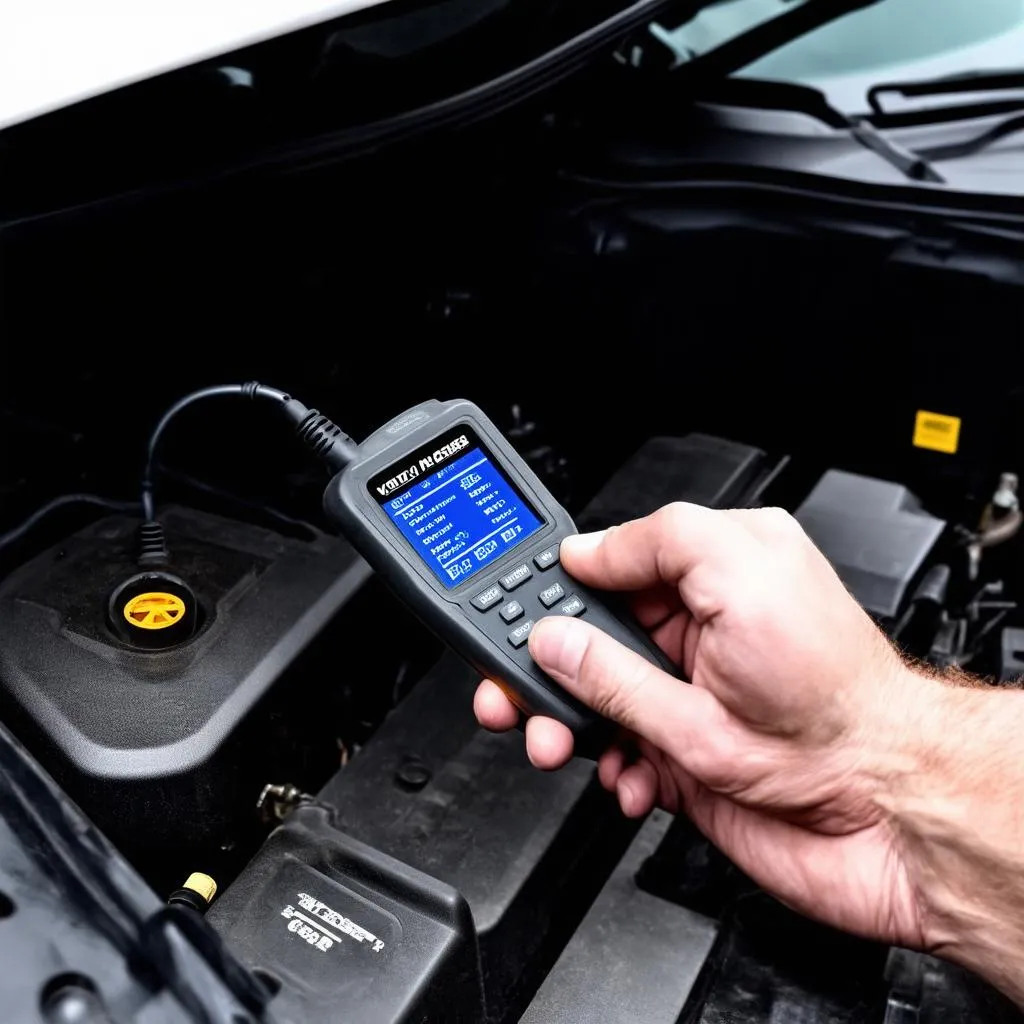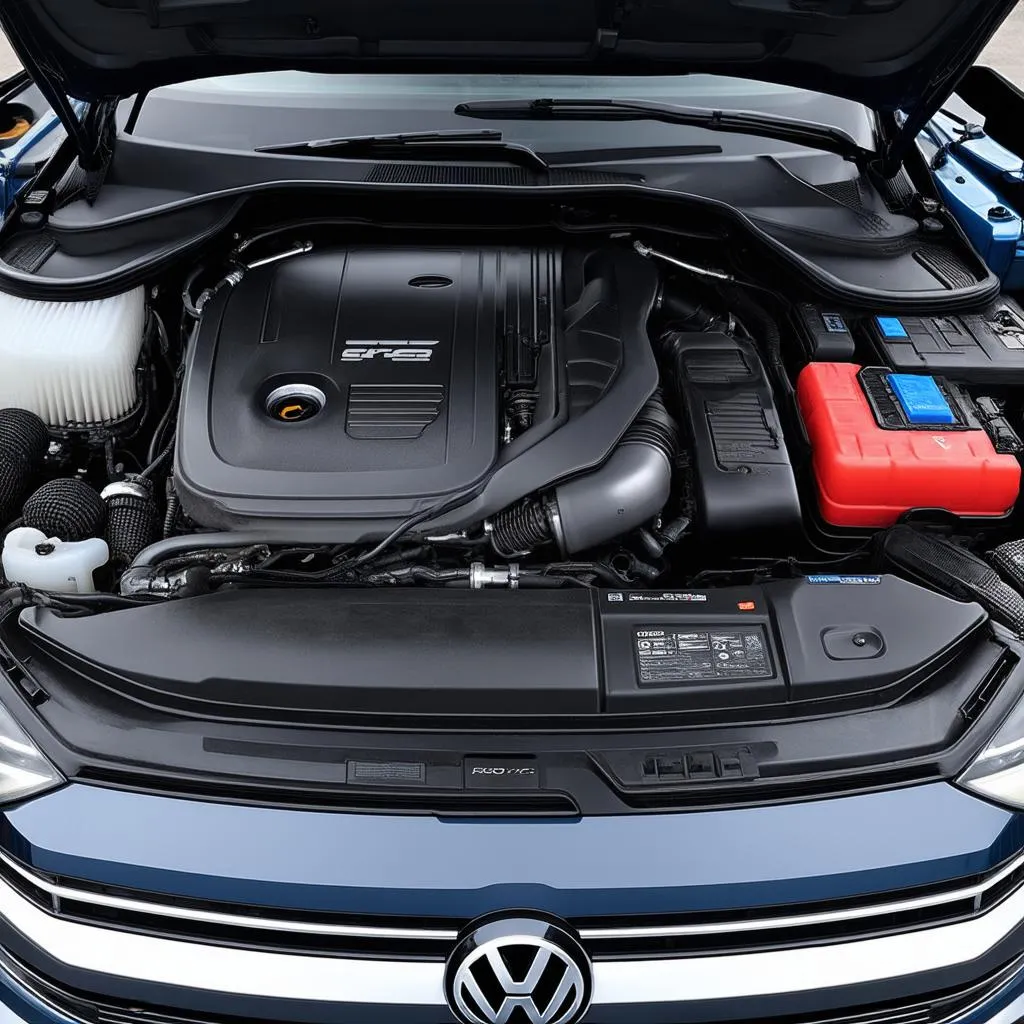“Check Engine” light glaring at you from your dashboard again? We’ve all been there, staring at that little orange symbol in our VW Passat, wondering what it all means. Before you start imagining plumes of smoke and engine failure, take a deep breath. It might just be your car’s way of starting a conversation – through the OBD system.
Imagine your Passat’s OBD (On-Board Diagnostics) system as its own personal health journal. It continuously monitors the engine, transmission, emissions, and other vital systems. When it detects something unusual, it logs a code in its memory. This code is like a secret message, waiting to be decoded. And that’s where the magic of an OBD scanner comes in.
Unlocking the Secrets: How OBD Scanners Work
Think of an OBD scanner as a translator between you and your Passat. It plugs into the OBD-II port (usually located under the dashboard, driver’s side), retrieves those cryptic codes, and translates them into plain English (or your preferred language). It’s like having a mechanic in your pocket, providing valuable insights into your car’s health.
But finding the right OBD scanner for your VW Passat can be like navigating a maze, especially with so many options available. Fear not! We’re here to guide you through the process.
Choosing the Right OBD Scanner for Your VW Passat
Not all OBD scanners are created equal. Some are basic code readers, while others are advanced diagnostic tools. Which one is right for you depends on your needs and technical skills.
1. Basic OBD-II Code Readers:
- Ideal for: DIY enthusiasts who want to understand and clear basic engine codes.
- Pros: Affordable and easy to use.
- Cons: Limited functionality, may not read all manufacturer-specific codes.
2. Advanced Diagnostic Scanners:
- Ideal for: Experienced DIYers and professionals who need in-depth diagnostics and advanced functions.
- Pros: Comprehensive code reading and analysis, live data streaming, bi-directional control (for certain models).
- Cons: More expensive, requires some technical knowledge.
Pro Tip: For VW Passat owners, it’s recommended to opt for a scanner that supports VW/Audi vehicles specifically. This ensures compatibility and access to manufacturer-specific codes.
Common VW Passat OBD Codes and What They Mean
Here are some common OBD codes you might encounter in your VW Passat and their possible interpretations:
- P0420: Catalyst System Efficiency Below Threshold (Bank 1) – Could indicate a failing catalytic converter, oxygen sensor issue, or exhaust leak.
- P0171: System Too Lean (Bank 1) – Suggests an air leak in the intake system, a faulty MAF sensor, or fuel delivery problems.
- P0300: Random/Multiple Cylinder Misfire Detected – Points towards spark plug issues, ignition coil problems, or vacuum leaks.
- P0138: O2 Sensor Circuit High Voltage (Bank 1, Sensor 2) – Indicates a problem with the downstream oxygen sensor, wiring, or its circuit.
Remember: These are just a few examples, and the actual cause of a particular code can vary depending on the year and model of your VW Passat. Always consult a professional mechanic for accurate diagnosis and repair.
Beyond Diagnostics: The Power of OBD
OBD scanners can do more than just read and clear codes. They can also provide valuable data like:
- Live Data Stream: Real-time information on engine speed, coolant temperature, oxygen sensor readings, and more, allowing you to monitor your car’s performance.
- Freeze Frame Data: Captures engine parameters at the moment a fault code was triggered, providing clues for diagnosis.
- Component Testing: Some advanced scanners allow you to test individual components like solenoids, actuators, and sensors.
OBD and Feng Shui: Finding Harmony in Your Driving Experience
While OBD technology might seem purely mechanical, there’s a fascinating parallel to be drawn with the ancient Chinese philosophy of Feng Shui. Just as Feng Shui aims to create balance and harmony in our living spaces, the OBD system strives to maintain equilibrium within your vehicle. A well-maintained car, free from error codes and running smoothly, can be seen as a reflection of positive energy flow, contributing to a more enjoyable and peaceful driving experience.
Frequently Asked Questions about VW Passat OBD
1. Where is the OBD-II port located in my VW Passat?
The OBD-II port is typically located under the dashboard on the driver’s side.
2. Can I use any OBD scanner on my VW Passat?
While a generic OBD-II scanner will read basic engine codes, it’s recommended to use a scanner specifically designed for VW/Audi vehicles to access manufacturer-specific codes.
3. What should I do if my check engine light comes on after clearing a code?
If the check engine light reappears after clearing a code, it indicates an underlying problem that needs to be addressed. It’s best to consult a mechanic for further diagnosis.
Take Control of Your VW Passat’s Health
 VW Passat OBD Scanner
VW Passat OBD Scanner
Understanding your VW Passat’s OBD system empowers you to take control of your car’s health. Whether you’re a seasoned DIYer or prefer leaving it to the professionals, having the right knowledge and tools can save you time, money, and unnecessary stress.
Need help with your VW Passat’s OBD system or looking for expert advice? Contact us on WhatsApp at +84767531508. Our team of automotive specialists is available 24/7 to assist you.
Explore Further:
Looking for more information about your VW Passat? Check out these related articles:
 VW Passat Engine Bay
VW Passat Engine Bay
Don’t let car troubles stress you out. With the right knowledge and a little help, you can keep your VW Passat running smoothly for years to come.
